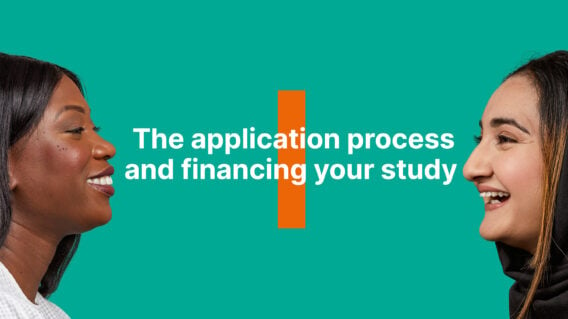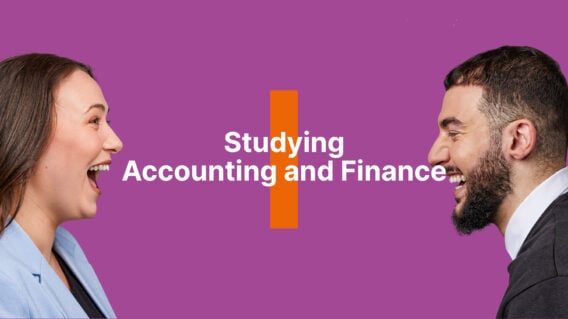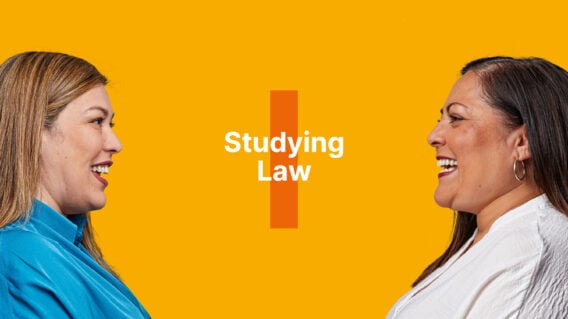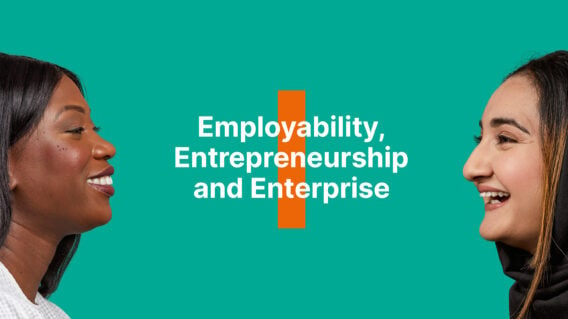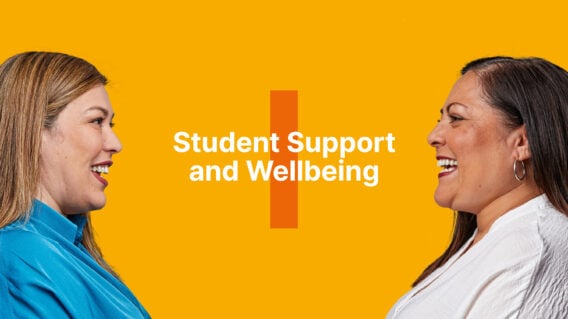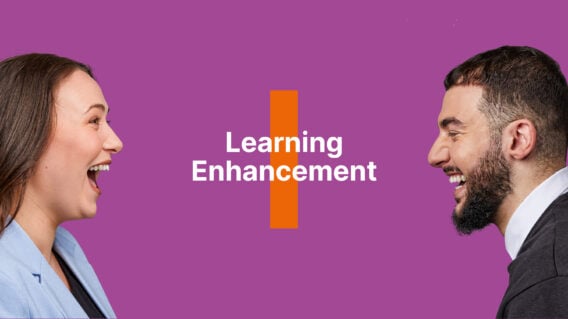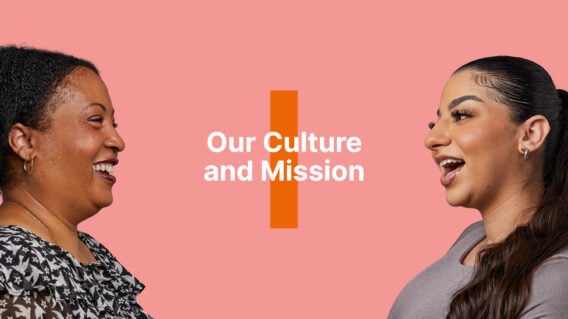Obtain your Business Management degree in just two years
Apply now to start in October 2025


Duration
2 years
Study mode
Full-time, Lectures, seminars and workshops 2 to 3 days per week
Start date
October
Awarding Body
Wrexham University
Fees year 1
Domestic: £11,100
International: £15,000
Location
Taught at our Central London campus
UCAS code
BM02
Entry Requirements
112 UCAS tariff points
What’s it like studying business management?
I knew I could grow my skillset in this institute. Through my years of study here, I have learned a lot of things about business management, they are really rich modules. Bloomsbury changed my mindset massively, and helped me understand exactly what I wanted to do with my future.

Course Modules
Each module is worth 30 credits and all Level 4 modules are mandatory. There are four Level 4 modules and you will complete two modules in your first term of Year 1, and two in your second term of Year 1.
This module provides students with knowledge and understanding of different types of organisations, their purposes, structures, and functions in contemporary business environments in which they operate. The module helps students to identify and explain contemporary issues from external factors that impact on the operations of organisations in an
increasingly dynamic and unpredictable local, national and the interconnected global business
environment
Assessment
| Portfolio | 40% |
| Poster presentation | 60% |
Please consider this: This module introduces students to the key principles and practices of marketing. The module equips students with the knowledge and understanding of marketing functions within the internal and external marketing environments and demonstrate how marketing concepts are applied to address market and customer needs.
Assessment
| Portfolio | 50% |
| Group project | 50% |
This module aims to provide students with an understanding of the essential concepts
involved in successful people and talent management, with the ability to analyse and
evaluate such concepts, along with the developmental skills required to ensure success
for both the organisation and employees. The module also aims to develop students’
knowledge and skills to carry out activities including HR planning, job design, recruitment,
selection, induction, retention, succession planning and dismissal.
Assessment
| In-class test | 50% |
| Simulation | 50% |
This module explores and analyse the relevant academic theory in the areas of business ethics,
sustainability and social impact. Furthermore, the module provides students with an understanding of fundamental financial concepts
and tasks which business owners and managers complete in the course of their work.
Students will not only learn about financial markets, institutions and products but will also
complete basic financial tasks, such as budget preparation and budgetary control, and will
explore technological solutions which assist business owners and managers. Additionally,
students will consider the latest developments in the field of financial services and will analyse
their impact on modern businesses.
Assessment
| Portfolio | 70% |
| Report | 30% |
Each module is worth 30 credits and all Level 5 modules are mandatory. There are four Level 5 modules and you will complete two modules in Term 3 of Year 1, and two modules in Term 1 of Year 2.
This module considers organisational behaviour concepts which inform practice so that you can confidently explain how leadership and culture influence each other and organisations as a whole. You’ll also analyse and evaluate your own capabilities to comsider how you can manage yourself and lead others in a professional context by creating a personal development plan.
Assessment
| Case study | 70% |
| Reflective practice | 30% |
How Business Intelligence (BI) supports businesses’ decision-making and evaluating the suitability of BI technology is examined in this module. You’ll uncover how to interpret data and information as well as how to visualise it in order to help others interpret it.
Assessment
| Report | 50% |
| Presentation | 50% |
Key principles, models and approaches for project and operations management are considered in this module. You will learn how to design a comprehensive project plan using suitable software and how to make recommendations.
Assessment
| In-class test | 50% |
| Project | 50% |
In the modern-day, all businesses and organisations must consider their environmental consequences and the social impact of their operations. This module will help you to identify and discuss the significant ethical and sustainability-focused issues confronting contemporary organisations. Using the 2030 Sustainable Development Goals (SDG) Agenda as a framework, this module will enable you to provide solutions to ethical issues arising in business.
Assessment
| Portfolio | 70% |
| Project | 30% |
Each module is worth 30 credits and only the Applied Business Strategy module is mandatory at Level 6. You must complete four Level 6 modules and can select your other three Level 6 modules to specialise your degree. The Applied Business Strategy module and one optional module will take place in Term 2 of Year 2 and your remaining two optional modules will take place in Term 3 of Year 2.
All optional modules are delivered subject to sufficient student demand. If an optional module cannot be delivered, students can complete an Independent Learning Module and base their study around the content of the optional module.
This module hones in on business strategy, management theories and concepts so that you can apply a range of tools to conduct strategic audits of organisations and their environment. How to justify sustainable strategies for organisations and produce an implementation plan are all covered in the Applied Business Strategy module.
Assessment
| Literature review | 40% |
| Report | 60% |
(Marketing Specialisation)
Critical evaluation of digital technologies’ and digital marketing tools’ impact on business activities form the basis of this module. You will learn how to examine and critically evaluate the importance of digital analytics in business performance and apply various tools to develop responsible, sustainable and ethical digital marketing campaigns. Evaluating the effectiveness of digital marketing campaigns is also covered in this module.
Assessment
| Written assignment | 40% |
| Simulation | 60% |
(Human Resource Management Specialisation)
This module considers the relationship between Human Resources and organisations’ business goals and objectives. You will discuss and critically evaluate Human Resources’ role in leading change within a business. Workforce planning and development practices are explored in the module, as are critically evaluating the appropriateness of HR policies and strategies within a changing environment and how this meets the interests of a range of stakeholders.
Assessment
| Portfolio | 70% |
| Presentation | 30% |
(Entrepreneurship Specialisation)
For this module, you will evaluate the feasibility of a business idea by developing a business plan for a start-up venture. You will select and apply appropriate techniques to deliver an effective business pitch.
Assessment
| Portfolio | 50% |
| Report | 50% |
(Marketing specialisation)
This module equips you with a powerful set of tools to take your marketing prowess to the next level. You will explore the latest in marketing and consumer research, as well as delve into consumer behaviour concepts. You’ll be able to skillfully critique and dissect the intricacies of strategic marketing decisions, and emerge with the ability to craft sustainable and effective marketing recommendations.
Assessment
| Portfolio | 50% |
| Group project | 50% |
(Human Resource Management specialisation)
By the end of this module, you’ll have a comprehensive understanding of the crucial role HR plays in business success. You will learn:
- How to skillfully navigate the most pressing issues facing modern businesses
- Critical techniques to evaluate management practices and find innovative solutions to improve performance.
- How to weigh up societal and environmental developments and their impact on the workplace and its people.
With a wide range of practical tools and techniques at your disposal, you’ll be equipped to tackle real-world HR challenges with confidence and promote best practices in any situation.
Assessment
| Portfolio | 50% |
| Coursework | 50% |
(Entrepreneurship specialisation)
This module provides the skills and knowledge to take organisations to new heights. You’ll learn how to evaluate different approaches to achieving growth and discover how to identify sustainable opportunities for development. You’ll also consider how to achieve this growth by assessing the resources you need, and managing the risks associated with growing a business. You will then amalgamate all of this into your own business growth plan.
Assessment
| Portfolio | 50% |
| Report | 50% |
For this module, you will put your degree to the test by diving into a complex business management investigative project of your choice. You’ll have the opportunity to showcase your skills and apply everything you’ve learned to analyse your topic from every angle. From choosing the best research methods to justifying your strategy, you’ll need to apply the right methodology for the job.
With your arsenal of theoretical frameworks, you’ll critically evaluate all the information you have gathered to draw powerful conclusions and propose feasible solutions to business problems.
Assessment
| Research proposal | 10% |
| Project | 90% |
Jumpstart your career and gain practical, real-life experience in the business world. You’ll have the chance to identify and tackle relevant, real-life business issues and expand your knowledge and understanding through the practical application of business theory on your Internship module.
With your academic knowledge and understanding, you’ll be able to transfer your skills to real-life situations, critically evaluate, and apply your newfound knowledge to produce a project report. As you reflect on your work-based business practice, you’ll see how academic knowledge and understanding underpin everything you do.
Assessment
| Written assignment | 70% |
| Reflective practice | 30% |
Take the reins of your own learning journey, in this module, you’ll have the freedom to explore a topic of your choice. You’ll learn how to negotiate, plan, and conduct a comprehensive study and assignment in your area of interest. With your newfound skills, you’ll become a critical thinker, able to identify and evaluate complex issues from multiple perspectives and synthesise compelling arguments to support your conclusions, solutions, or recommendations. This module proves your ability to evaluate and apply knowledge so that you’re able to communicate your findings with confidence and impact.
Assessment
| Written assignment | 20% |
| Written assignment | 80% |
Should you wish to do so, you can graduate with BA (Hons) Business Management (Marketing), BA (Hons) Business Management (Entrepreneurship) or BA (Hons) Business Management (Human Resource Management) by selecting relevant Level 6 modules.
To receive BA (Hons) Business Management (Marketing), you must complete the following two Level 6 modules:
- Digital Marketing
- Advanced Marketing with Consumer Behaviour
If you wish to graduate with BA (Hons) Business Management (Entrepreneurship), you must complete the following two Level 6 modules:
- Innovation and Business Planning for Entrepreneurs
- Business Development for Entrepreneurs
You can graduate with BA (Hons) Business Management (Human Resource Management), by completing the following two Level 6 modules:
- Human Resource and the Business
- Applied Human Resource Management
We actively recruit globally, where you will find us at education fairs, see us on social media, and hear our name via student counsellors.
To find out if we accept your international qualifications, on many of our course pages you will find a box where you will be able to see which equivalent qualifications we accept per country. If you are unsure, just contact us.

When you graduate, you also receive a CMI Level 5 qualification and can apply for Chartered Manager status, the highest status that can be achieved in the management and leadership profession

You can complete an internship module as part of this course and expand your knowledge through the practical application of business theory. Our Careers Hub also helps students to take part in paid and voluntary positions.
- 112 UCAS tariff points.
- If you do not meet these requirements, you may be considered as a non-standard applicant.
Please note that we are only able to accept applications from domestic applicants for our BA Business Management, Accelerated course. International applicants are welcome to apply for our three-year course.

How the application process works
Complete the application form to let us know which course you would like to study and your existing qualifications.
Apply for Student Finance as soon as you have submitted your application to avoid delays.
You will be offered a place if you meet the entry requirements, or, invited to an Admissions Assessment.
International applicants are issued a CAS or may take a Pre-CAS Interview in order to gain a Student visa.
Welcome to Bloomsbury Institute! Enrolment and Induction take place the week before your studies begin.

We pride ourselves on supporting each and every student on an individual basis. Disabilities, long-term medical conditions, or specific learning difficulties are never barriers to success at Bloomsbury Institute.

This course is accredited by the CMI. Accreditations and body memberships increase the value of your degree and in turn your employment prospects.

Our Student Guild is here to support you, enhance your experience and represent your views. The Guild is student-led so get involved and help improve the Bloomsbury experience for you and fellow students.

Don’t let the cost of travel prevent you from success in your studies. Travel Bursaries (covering Transport for London’s Zones 1 – 6) are available to all students funded through the Student Loans Company.
Please note: From October 2025, the Travel Bursary will be replaced by a Household Income Bursary and Childcare Grant. This change offers students flexibility and additional support based on individual needs. For more information, including eligibility criteria, click here and go to page 28.

Home student fees apply to students who do not require a Student Visa to study in the UK (e.g. UK and Irish citizens; EU citizens with settled or pre-settled status).
Gain a greater insight into learning
Do you have any question about studying with us? Check out our Podcast series, Insights into Learning, that covers all the issues that applicants frequently ask us.
You will gain insights from our subject experts and learn more about life at Bloomsbury Institute.
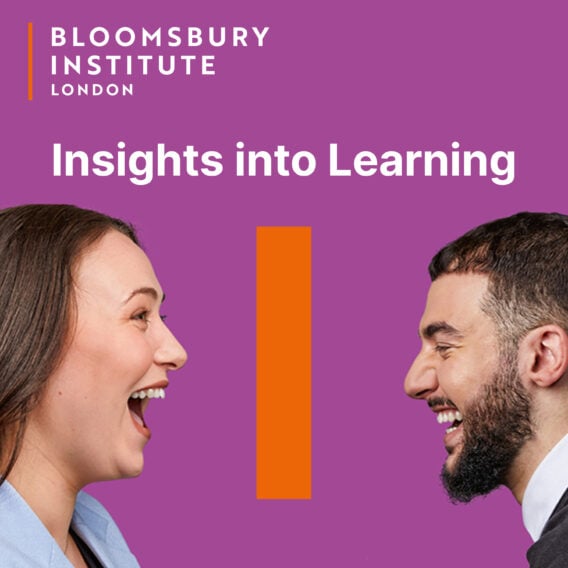
Explore more Business Management courses
Duration:
1 YearStudy:
Full-TimeStart:
February, June, or October